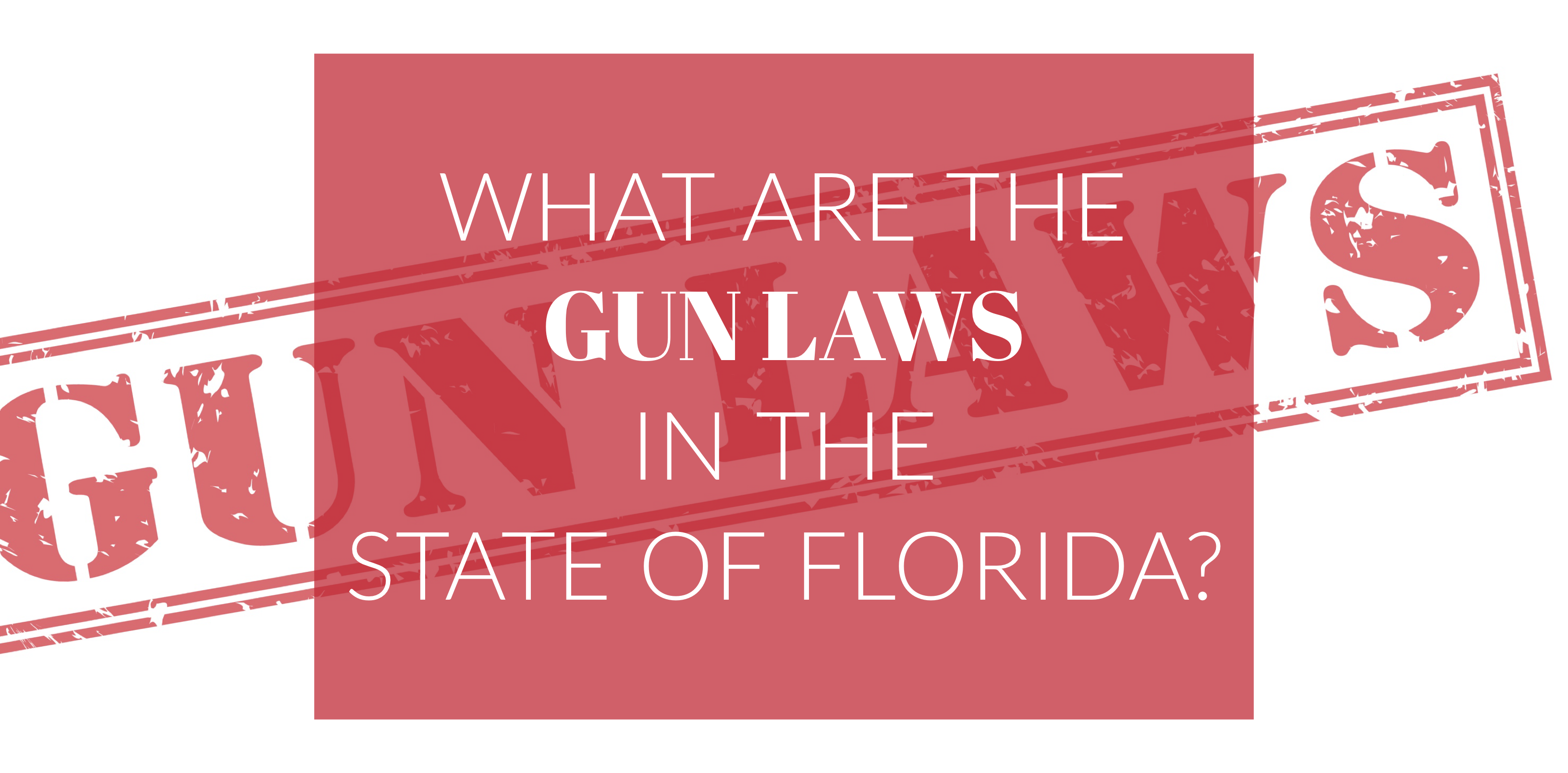 There has been a lot of talk about new legislation regarding firearms, but what is the current status of the law as it relates to guns? Criminal defense lawyers know that there are plenty of firearm statutes with extreme high range of punishments already on the books in Florida. These laws are coupled with very long minimum mandatory sentences. There are also many different and often overlapping state and federal laws regulating all aspects of firearm possession, use, distribution, manufacturing, and more. This blog will lay out some of the more common firearm statutes in the State of Florida.
There has been a lot of talk about new legislation regarding firearms, but what is the current status of the law as it relates to guns? Criminal defense lawyers know that there are plenty of firearm statutes with extreme high range of punishments already on the books in Florida. These laws are coupled with very long minimum mandatory sentences. There are also many different and often overlapping state and federal laws regulating all aspects of firearm possession, use, distribution, manufacturing, and more. This blog will lay out some of the more common firearm statutes in the State of Florida.
What are the common gun laws in the State of Florida?
Many of the Florida gun laws are located in Chapter 790 of the Florida Criminal Statutes. Here are some of the more common statutes:
Open Carrying of a Firearm, Fla. Stat. S. 790.054
It is illegal to openly carry any firearm on or about your person. Any person who violated this law commits a second degree misdemeanor punishable by up to sixty (60) days in jail. It is not illegal for a person with a concealed firearms permit to briefly and openly display the firearm. However, this portion of the statute is open to interpretation and designed to allow a concealed firearm permit holder to briefly remove their concealed firearm from their person to secure it when they do not want to take the firearm with them.
Carrying a Concealed Firearm, Fla. Stat. S. 790.01(2)
Any person who carries a concealed firearm “on or about” their person and who does not have a concealed firearms permit commits a third degree felony punishable by up to five (5) years in prison. Concealed means that it is concealed from the ordinary sight of another person. This means that if the firearm is even partially concealed, it could be a violation of the law. Nearly any person who possesses a firearm in public without a concealed firearm permit is going to run afoul of this law.
Possession of a Firearm or Ammunition by a Convicted Felon or Adjudicated Delinquent, Fla. Stat. S. 790.23
It is unlawful for any person who has been convicted of a felony or for any person under 24 years of age who has been adjudicated delinquent on a felony to possess a firearm. This is a very serious charge that carries a maximum of fifteen (15) years in prison. If a person is a convicted felon and actually possesses the firearm, there is a three (3) year minimum mandatory sentence that would have to be served day for day with no gain time.
Improper Exhibition of a Firearm, Fla. Stat. S. 790.10
Showing a firearm to another person in a “rude, careless, angry, or threatening manner” is a crime that comes with a possible sentence of up to a year in jail. This is different than aggravated assault with a firearm which is threatening someone with a firearm. A conviction under the improper exhibition of a firearm does not require any threat be made.
Possessing a Firearm on School Property, Fla. Stat. S. 790.115
It is illegal to possess a firearm on school property, a school bus, school bus stop, or at a school sanctioned event, even if you have a concealed firearms permits. There are very few exceptions to this rule, which includes school sanctioned shooting events. There is a narrow exception for possession of firearms in one’s vehicle. It is a third degree felony punishable by up to five (5) years in prison to violate this statute. Concealed Firearm Permit holders who violate the possession on school property statute commit a second degree misdemeanor punishable by up to sixty (60) days in jail. If the firearm is discharged, it is a second degree felony punishable by up to fifteen (15) years in prison, whether you are a concealed firearm license holder or not.
Discharging a Firearm in public, Fla. Stat. S. 790.15
If you knowingly discharge a firearm in a public place or recklessly or negligently discharge a firearm outdoors on any property used as a dwelling (designed for someone to live there) or zoned for residential use, you can be incarcerated for up to one (1) year in jail.
Using a Firearm while under the influence, Fla. Stat. S. 790.151
Any person who discharges or has a loaded gun in their hand and is under the influence of alcohol or controlled substances can be incarcerated up to 60 days in jail.
Furnishing a Firearm to a Minor, Fla. Stat. S. 790.17
Providing a minor a firearm without the parent’s permission or to any person of unsound mind is a first degree misdemeanor punishable by up to one (1) year in jail.
Safe Storage of Firearms Required, Fla. Stat. S. 790.174
Storing a loaded firearm in an area or a way that a child under 16 is likely to find it commits a second degree misdemeanor punishable by up to sixty (60) days in jail if a minor gains access to the gun without the minor’s parent’s permission and possesses it or exhibits it in a public place, or in a rude, careless, angry or threatening manner. If a child obtains a firearm that was not properly stored and accidentally or intentionally uses it and kills another person, the owner of the firearm could be charged with manslaughter, child abuse, or some other general statute.
Shooting into a dwelling, Vehicle, etc., Fla. Stat. S. 790.19
It is a crime to wantonly or maliciously shoot at, within or into any public building , bus, train, car, or other vehicle. A person who is convicted under this statute faces up to fifteen (15) years in prison.
Aggravated Assault, Aggravated Battery, Attempted Murder
There are specific sentencing enhancements for violent crimes where a firearm is possessed, discharged, or discharged and causes great bodily harm or death. For example, there is a 3 year minimum mandatory sentence to actually possess a firearm as a convicted felon, in a car burglary, or in an aggravated assault. There is a 10 year minimum mandatory sentence to possess a firearm during the commission of many crimes, including robbery, burglary to a house, and more. There is a 20 year minimum mandatory sentence to discharge a firearm during the commission of many offenses including aggravated assault, aggravated battery, attempted murder, robbery, burglary and more. And if you cause great bodily harm or death as a result of the discharge, it is a 25-life minimum mandatory sentence.
Many firearm offenses can also be enhanced, meaning for example that if the commission of the offense was a third degree felony punishable by up to five (5) years in prison, the maximum sentence would be enhanced to that of a second degree felony punishable by up to fifteen (15) years in prison.
 Jeremy Lasnetski, managing partner at Lasnetski Gihon Law is a Florida Bar Board Certified Criminal Trial Lawyer and has been practicing criminal law in Jacksonville for over 16 years. Mr. Lasnetski received his Bachelor of Arts degree with honors from the University of Florida in 1997 and went on to obtain a law degree and an M.B.A. from the University of Florida in 2001.
Jeremy Lasnetski, managing partner at Lasnetski Gihon Law is a Florida Bar Board Certified Criminal Trial Lawyer and has been practicing criminal law in Jacksonville for over 16 years. Mr. Lasnetski received his Bachelor of Arts degree with honors from the University of Florida in 1997 and went on to obtain a law degree and an M.B.A. from the University of Florida in 2001.
After graduation, Mr. Lasnetski accepted a position as a prosecutor at the State Attorney’s Office in Jacksonville. During the next 6 1/2 years as a prosecutor, Mr. Lasnetski tried more than 50 criminal trials, including more than 40 felony trials. He was promoted in 2007 to Division Chief of the Repeat Offender Unit. Mr. Lasnetski was also a full time member of the Homicide Prosecution Team. In 2008, Mr. Lasnetski formed the Law Office of Lasnetski Gihon Law and began defending citizens in criminal court. He represents clients in both State and Federal criminal courts.
 Jacksonville Criminal Lawyer Blog
Jacksonville Criminal Lawyer Blog

